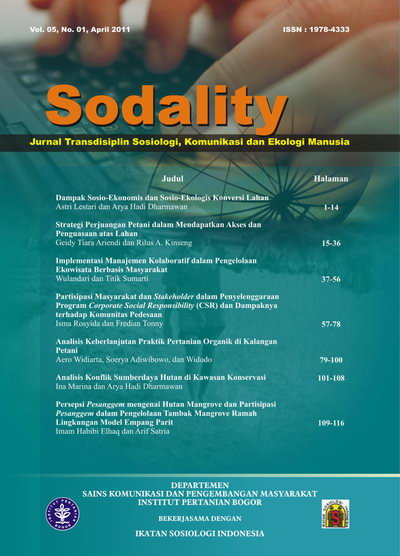PERSEPSI PESANGGEM MENGENAI HUTAN MANGROVE DAN PARTISIPASI PESANGGEM DALAM PENGELOLAAN TAMBAK MANGROVE RAMAH LINGKUNGAN MODEL EMPANG PARIT
Abstract
This research was aimed to: (1) analyze perception of the pesanggem about mangrove forest; (2) analyze participation of the pesanggem in an Environmental Friendly Mangrove Embankment Empang-Parit Model Management; (3) analyze the correlation between perception and participation of pesanggem in mangrove embankment management. This research has been conducted by using survey method and supported by qualitative method with in-depth interview and observation. Qualitative method aimed to gain in-depth understanding related to the data which has been obtained from quantitative method. The result shows that most of the pesanggem has positif perception about mangrove forest ecosystem and ecology function of mangrove forest. Most of the pesanggem has negative perception about social-economy function of mangrove forest. Most of the pesanggem has low level participation in planning phase and monitoring phase. Most of the pesanggem has high level participation in implementation phase and benefitted phase.
Published
2011-04-11
How to Cite
Habibi ElhaqI., & SatriaA. (2011). PERSEPSI PESANGGEM MENGENAI HUTAN MANGROVE DAN PARTISIPASI PESANGGEM DALAM PENGELOLAAN TAMBAK MANGROVE RAMAH LINGKUNGAN MODEL EMPANG PARIT. Sodality: Jurnal Sosiologi Pedesaan, 5(1). https://doi.org/10.22500/sodality.v5i1.5829
Section
Articles
Authors who publish with this journal agree to the following terms:
- Authors retain copyright and grant the journal right of first publication with the work simultaneously licensed under a

This work is licensed under a Creative Commons Attribution 4.0 International License. that allows others to share the work with an acknowledgement of the work's authorship and initial publication in this journal. - Authors are able to enter into separate, additional contractual arrangements for the non-exclusive distribution of the journal's published version of the work (e.g., post it to an institutional repository or publish it in a book), with an acknowledgement of its initial publication in this journal.
- Authors are permitted and encouraged to post their work online (e.g., in institutional repositories or on their website) prior to and during the submission process, as it can lead to productive exchanges, as well as earlier and greater citation of published work (See The Effect of Open Access).





.png)









